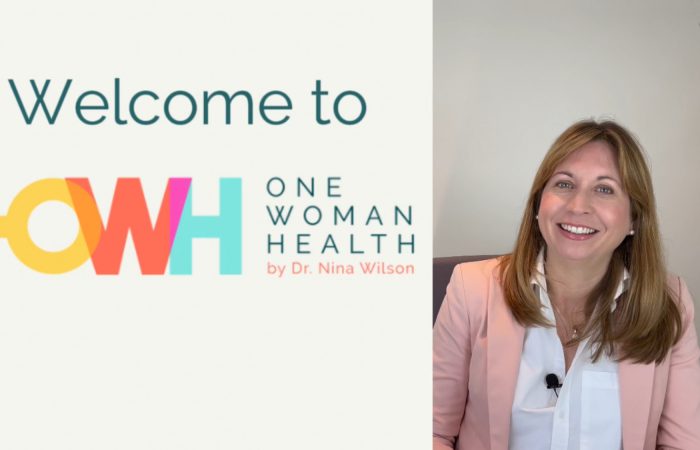SPOTLIGHTING HEALTH’S FEMALE LEADERS: DR NINA WILSON
Happy International Women’s Day 2022 from One Woman Health!
In celebration of International Women’s Day, I was delighted to be interviewed by the Association of British Healthtech Industries about the ways we can support women in leadership. This is, of course, a topic very close to our heart and central to our mission. With close to a million women lost to the workforce due to the impact of menopause and 9 out of 10 reporting that menopause has negatively impacted on their work, supporting the health of women is the first pillar of ‘levelling the playing field’ in the workplace. From a place of health and wellbeing flows the confidence and energy to take on new challenges and achieve amazing things.
The article is reproduced below and the original publication can be found here.

Please introduce yourself, including your role within your organisation, and a short overview of your career path.
I am Nina Wilson, CEO and Founder of One Woman Health, an online clinic dedicated to the health of women in midlife.
I trained in medicine and practice as a GP and menopause specialist. Alongside this, I have always held additional roles that appeal to my creative side, developing the future of medicine. I was formerly the Medical Director of Livi, Europe’s largest online healthcare provider, and Head of Standards in Digital Health and AI at NHSX.
OWH is a medical clinic offering treatment for women to optimise their health so they can feel their best and achieve their goals. We also work with organisations to raise awareness and offer bespoke corporate healthcare packages. We recently launched our specialist menopause service as this is an area of huge unmet need.
What has been the biggest leadership lesson in your career?
I grew up with the message that women and men are equal. I thought that meant we would be competing on an even footing in the workplace, but for a variety of reasons this is often not the case. At the heart of unconscious bias is how we perceive power and what is powerful. Culturally, we tend towards a ‘male‘ view of what power looks like, acts like, speaks like. Evidence backs up that women are received differently for similar behaviours e.g. a women may be ‘bossy’ where a man is ‘assertive’. This puts women in a double bind. Changing the power structure in society, through female representation in senior roles across all sectors, on boards, and in government, is a way to gain a more diverse view of power. This underpins One Woman Health – supporting women to feel their best so they can step forward into new challenges for a more equal society.
How do you make sure your work is inclusive of others?
As a digital business, we can benefit from the advantages that operating largely online brings to patients and staff. Being online means people can access care independent of geography or fit an appointment around other commitments more easily. Similarly, our team can work flexibly in terms of time and location. Outside the office, I’m involved in diversity and equality initiatives at a local school as I believe the experiences of children growing up will influence their attitudes as adults. Finally, as a woman in HealthTech, I have had the benefit of some fantastic mentors. As the business grows, I hope to pay this forward to support other aspiring young people.
“You can achieve your goals, but do not necessarily expect the path to be linear.”
What advice would you share with the female HealthTech leaders of tomorrow?
That you can achieve your goals, but do not necessarily expect the path to be linear. The fact is that many women’s lives exist in phases. Life milestones may influence what you want and need, how you feel and how you structure your days. That’s Ok. The key is to work out what matters to you and get the support you need.
What I see with menopause is that because it occurs in an intense period of life, many women do not recognise the symptoms early and battle on, putting them down to stress or expecting themselves to ‘just cope’ with more and more. Many are juggling professional demands with the needs of ageing parents, partners, children. There is not the time or space for self-care, but I see this damage self-confidence as well as health as women struggle to push on through.
Investing in your own health and well-being may seem impossible with the multitude of demands on time, but it has to be a priority and pays dividends now and in the future.
“If you want to promote greater diversity it is important to understand the drivers, needs and barriers experienced by different demographics in the workforce.”
What advice would you share with those who want to support the female HealthTech leaders of tomorrow?
The key concept in Caroline Criado-Perez’ book ‘Invisible Women’ is that it is not enough to offer equal opportunities. Differential uptake will likely reinforce the status quo. If you want to promote greater diversity it is important to understand the drivers, needs and barriers experienced by different demographics in the workforce. Disaggregate the data, really understand what different groups need, then create systems and a culture that actively respond to these requirements.
This makes sense to me as it resonates with my training in general practice, the only area of medicine to look at the person as a whole being, with biological, psychological, social and environmental factors impacting on health.


